Explaining the GAAP between Book and Taxable Income
A recent study identifies dozens of large companies that paid no income taxes in 2020. While such studies get headlines and may seem shocking, the reality is much more mundane.
4 min readErica York is Senior Economist and Research Director with Tax Foundation’s Center for Federal Tax Policy. She previously worked as an auditor at a large community bank in Kansas and interned at Tax Foundation’s Center for State Tax Policy.
Her analysis has been featured in The Wall Street Journal, The Washington Post, Politico, and other national and international media outlets. She holds a master’s degree in Economics from Wichita State University and an undergraduate degree in Business Administration and Economics from Sterling (KS) College, where she is currently an adjunct professor. Erica lives in Kansas with her husband and their two children.


A recent study identifies dozens of large companies that paid no income taxes in 2020. While such studies get headlines and may seem shocking, the reality is much more mundane.
4 min read

The Biden administration will have to balance the desire to increase social spending through the tax code with the need to collect revenue and have a tax system that is transparent and easy to understand.
5 min read

During the pandemic, economic relief administered through the tax code exploded as Congress passed nearly $6 trillion of legislation into law. That left the 2021 tax filing season, which ended May 17, with complications that still linger.
4 min read

In a new report, the Congressional Budget Office (CBO) analyzes federal policies that influence R&D spending in the pharmaceutical industry. The report highlights how taxes affect R&D investment incentives, underscoring the importance of structuring the tax code so that it is not biased against investment.
4 min read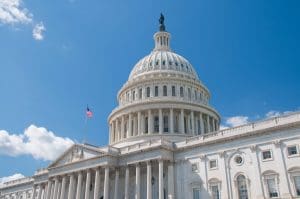

While much of the tax policy now under debate aims to increase the tax burden on businesses, several policies in the newly released Republican Study Committee (RSC) budget for Fiscal Year 2022 focus on reducing the tax code’s barriers to investment and saving.
3 min read

The Biden administration’s proposed American Families Plan includes several major tax changes. Explore the tax proposals in the American Families Plan.
10 min read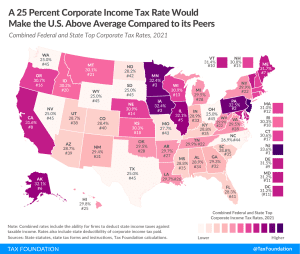

Some lawmakers have expressed concerns about President Biden’s proposal to raise the federal corporate income tax rate from 21 percent to 28 percent, and instead suggest raising the rate to 25 percent.
2 min read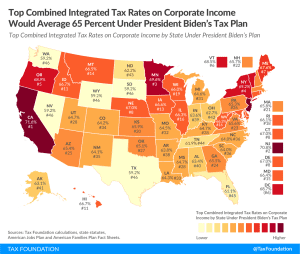

Under President Biden’s tax plan, the United States would tax corporate income at the highest top rate in the industrialized world, averaging 65.1 percent.
3 min read

In his first 100 days as president, Joe Biden has proposed more than a dozen significant changes to the U.S. tax code that would raise upwards of $3 trillion in revenue and reduce incentives to invest, save, and work in the United States.
4 min read

The Biden administration is proposing to tax long-term capital gains at ordinary income rates for high earners, which will bring the top federal rate to highs not seen since the 1920s.
2 min read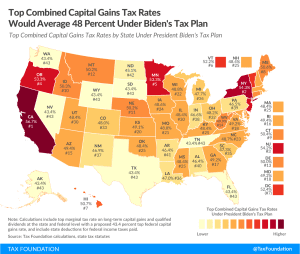

The top federal rate on capital gains would be 43.4 percent under Biden’s tax plan (when including the net investment income tax). Rates would be even higher in many U.S. states due to state and local capital gains taxes, leading to a combined average rate of over 48 percent compared to about 29 percent under current law.
3 min read

President Biden’s choice to fund new spending programs with increased corporate taxes comes with trade-offs for American output and incomes.
3 min read

The Options guide presents the economic effects we estimate would occur in the long term, or 20 to 30 years from now, but we can also use our model to show the cumulative effects of the policy change—providing more context, for instance, about how the effects of a higher corporate income tax rate compound over time, which we estimate would reduce GDP by a cumulative $720 billion over the next 10 years.
4 min read

An increase in the federal corporate tax rate to 28 percent would raise the U.S. federal-state combined tax rate to 32.34 percent, higher than every country in the OECD, the G7, and all our major trade partners and competitors including China.
6 min read

In an effort to rein in perceived excesses in executive compensation, Sen. Bernie Sanders (I-VT) and other co-sponsors have proposed to increase a company’s corporate income tax rate progressively based on the difference between median worker pay and CEO pay.
4 min read

Since 1987, unemployment compensation benefits have been subject to federal income tax and, in most states, to state income tax. According to the Congressional Research Service, such treatment—including unemployment compensation benefits in taxable income—is common across industrial nations.
4 min read

As the Biden administration and Congress consider making the expanded child tax credit permanent, a nearly $1.6 trillion expansion of tax code-administered benefits, they should consider financing it in a way that doesn’t create significant headwinds to economic recovery.
3 min read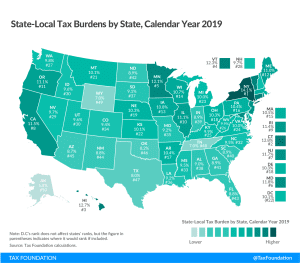

New Yorkers faced the highest burden, with 14.1 percent of income in the state going to state and local taxes. Connecticut (12.8 percent) and Hawaii (12.7 percent) followed.
19 min read

As lawmakers evaluate how to respond to the global semiconductor shortage, they should consider allowing full cost recovery across all types of capital investment—inventories, machinery and equipment, structures, and R&D.
4 min read

The major tax-related benefits in the $1.9 trillion economic relief plan are a third round of direct payments, extended unemployment insurance (UI) benefits and a $10,200 unemployment insurance income exemption for 2020, and an expansion of the Child Tax Credit.
5 min read